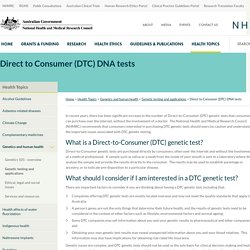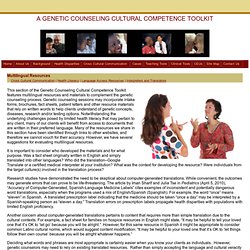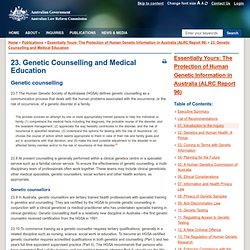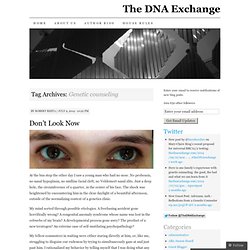

Direct to Consumer (DTC) DNA tests. In recent years, there has been significant increase in the number of Direct-to-Consumer (DTC) genetic tests that consumers can purchase over the internet, without the involvement of a doctor.

The National Health and Medical Research Council (NHMRC) recommends that consumers interested in purchasing DTC genetic tests should exercise caution and understand the important issues associated with DTC genetic testing. What is a Direct-to-Consumer (DTC) genetic test? Direct-to-Consumer genetic tests are purchased directly by consumers, often over the internet and without the involvement of a medical professional. A sample such as saliva or a swab from the inside of your mouth is sent to a laboratory where they analyse the sample and provide the results directly to the consumer. The results may be used to establish parentage or ancestry, or to indicate pre-disposition to a particular disease. Sounding board for prospective & current genetic counseling students. @mapsandgenes. Genetic Counseling Cultural Competence Toolkit. Multilingual Resources Cross Cultural Communication | Health Literacy | Language Access Resources | Interpreters and Translators This section of the Genetic Counseling Cultural Competence Toolkit features multilingual resources and materials to complement the genetic counseling process.

Genetic counseling sessions may incorporate intake forms, brochures, fact sheets, patient letters and other resource materials that rely on written words to help clients understand of genetic concepts, diseases, research and/or testing options. Notwithstanding the underlying challenges posed by limited health literacy that may pertain to any client, many of our clients will benefit from access to documents that are written in their preferred language. Many of the resources we share in this section have been identified through links to other websites, and therefore we cannot vouch for their accuracy. However, we have several suggestions for evaluating multilingual resources. Arabic: American Sign Language:
Genetic counselling. 23.7 The Human Genetic Society of Australasia (HGSA) defines genetic counselling as a communication process that deals with the human problems associated with the occurrence, or the risk of occurrence, of a genetic disorder in a family.

Genetic counseling. Katie Stoll is a genetic counselor in Washington State.

She graduated from the Brandeis University training program in 2003 and since that time has held positions in the areas of prenatal, pediatric and cancer genetic counseling. We recently said good-bye to Adrienne Asch, a thoughtful and powerful voice in bioethics, disability, and reproductive rights. Adrienne passed away at her home in New York on November 19, 2013, surrounded by the love of many friends and family. Adrienne touched my life deeply in the brief time I knew her and I am grateful to have had a connection with her. Her perspective has significantly shaped the way I view the genetic counseling profession and my role within it.
Adrienne was an accomplished scholar and an incredible person. Many genetic counselors are aware of Adrienne’s focus on the intersection of disability rights with reproductive technologies. Adrienne: Yes. Anna: Yeah. Adrienne: Not well. Anna: [laughs] What [laughs]…what did you say to them? Like this: Cancer Genetic Counseling. Surrogate baby story highlights visa ‘discrimination’ on health grounds. The story about an Australian couple not bringing their son with Down Syndrome, born via surrogate in Thailand, home to Australia has revealed that people with the condition may not be granted a visa.

Under the Immigration Act, anyone who is likely to cost Australia’s health service more than $40,000 over their lifetime is unlikely to be granted a visa to live in the country, a situation that many people are unaware of. Anyone likely to cost the Australian health system more than $40,000 in their lifetime may be rejected for a visa According to Down Syndrome Australia chief executive Catherine McAlpine, the rules in the Act can exclude people with Down Syndrome from being able to immigrate to Australia, even if they meet all other requirements. ‘They say you’ll be a burden on the tax payer if you’ll cost more than $40,000 in health care over your life and reject those people. She pointd out that others have been refused visas due to an act that is ‘discriminatory’.